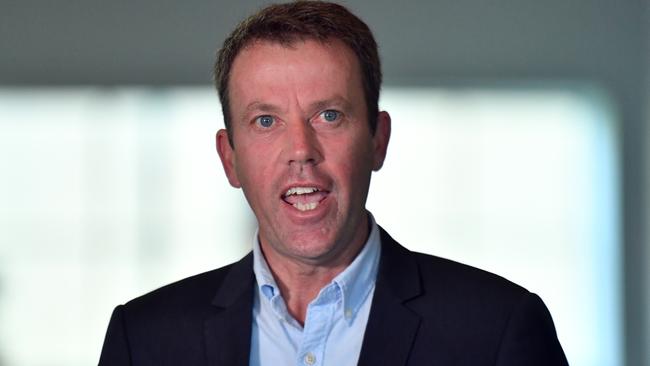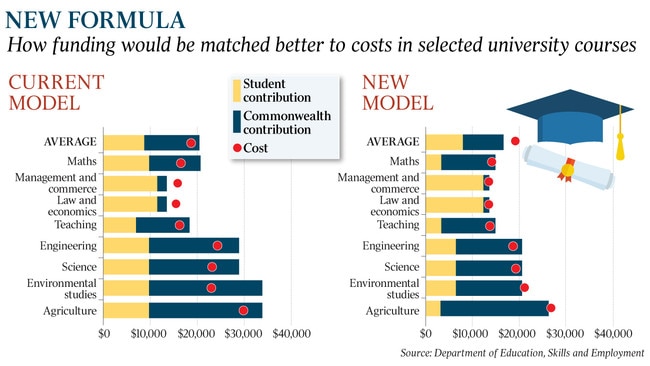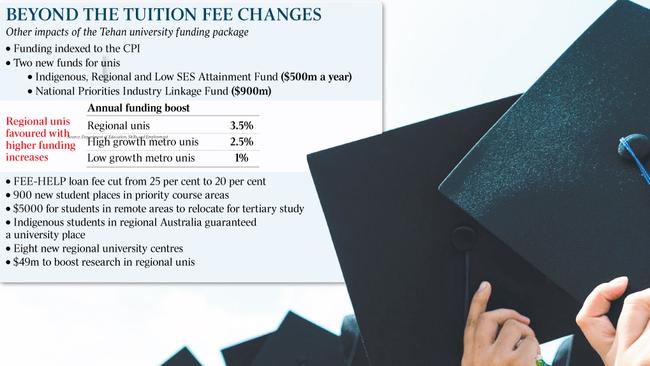Universities face block in rush to humanities
Education Minister Dan Tehan says he will put in place a system to stop universities funnelling students into humanities courses.

Education Minister Dan Tehan says he will put in place a system to stop universities funnelling students into humanities courses as the Morrison government hits back at suggestions from the higher education sector its funding shake-up would inadvertently incentivise those enrolments.
Mr Tehan told The Australian he would “establish a mechanism to ensure universities do not exploit humanities students by moving away from providing a quality degree that is consistent with the costs charged to the student and the federal government”.
His intervention comes after the country’s highest-profile chancellors — former High Court chief justice Robert French and former foreign minister Julie Bishop — said universities could try to recruit more humanities students because they would provide higher fee revenue.
But Mr Tehan gained the support of University of Wollongong vice-chancellor Paul Wellings, the first higher education leader to emphatically support the funding reform.
Under the government’s proposal, courses like science, technology, engineering and maths would have lower fees in a bid to encourage enrolments in high-priority fields. Law, commerce and humanities subjects would have higher fees, which would end up in university coffers. “There could be an unintended consequence — and I am not saying this will happen — that universities try to recruit students to humanities courses because of the lower overhead costs,” Mr French, now at the University of Western Australia, said on Monday.
Mr Tehan did not provide details about what a mechanism to prevent humanities students being “exploited” would look like. But he defended the level of funding for science, technology, engineering and maths courses.

“Australia is facing the biggest economic downturn since the Great Depression and young Australians will bear the brunt,” he said. “It is beholden on everyone who has a job educating Australians to do the right thing by them — and that includes giving them the skills and education they need to get a job.” Mr Tehan said universities would get extra support to deliver those courses through a previously announced $900m program called the National Priorities and Industry Linkage Fund.
Professor Wellings, who previously led a review of performance-based funding for Mr Tehan, said critics of the overhaul were overlooking the policy’s key features. “I think it’s a pretty fine piece of work and one we should engage with,” he said.
Universities Australia, which represents the country’s higher education sector, has so far only given cautious support to the plan and said it needed more details.
Professor Wellings, however, said he was pleased that Mr Tehan’s package included the return of indexation for course funding, the “complete preservation” of the income-contingent loans scheme and additional places for universities in growth areas.
“We haven’t lost money, that’s the important point, because there are a lot of sectors which will be incredibly tightly squeezed,” he said.

Professor Wellings also pointed to support for student places in priority areas helping universities to offer courses to meet future job needs in AI, digital fields, ageing and health.
But former prime minister Malcolm Turnbull said the fee overhaul was “puzzling” and he could not see a reason to double the cost of arts courses. “The only part of this that I have got a little sympathy for is the effort to discourage people from doing law,” he told the ABC. “I think it is baffling. They’ve got a point about law, but apart from that, I find the changes very puzzling.”
Experts have warned the HECS-HELP scheme, which allows students to repay the cost of their degrees over time, diminishes any price signal the government may try to put out on courses.



To join the conversation, please log in. Don't have an account? Register
Join the conversation, you are commenting as Logout